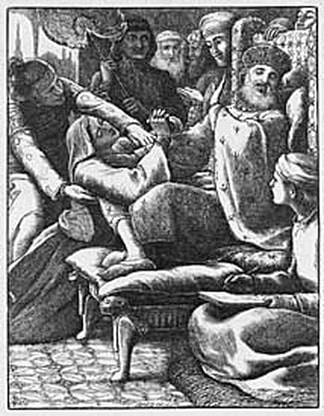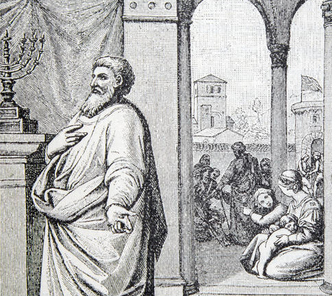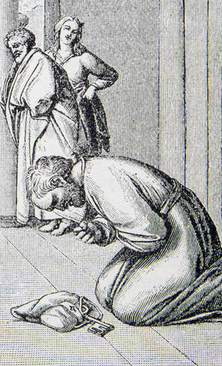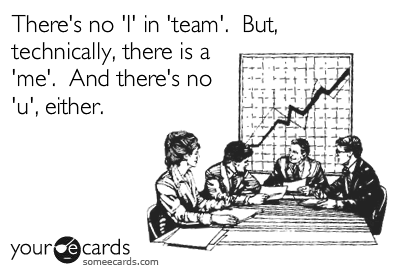|
or, The Utterly Unselfish Prayer (Starting Sep 12, Sunday sermons will address Dangerous Prayers. Be there or follow online.) There are hundreds of prayers in the Bible. One could start at Genesis and buzz through, snarfing insights like a bee among the flowers. I was tempted to do that. Tempted for about six seconds. But I knew of two prayers that Jesus presented as exemplary. First: "God, have mercy on me a sinner." Genuine humility is fundamental to prayer. Humility is a basic stretch before the activity of prayer. Humility is not simply focusing on how I have messed up, or how messed up I am. Continued self-focus can do more harm than good. Humility best starts from appreciating what the Creator has done for all of us! Humility includes trusting that the Almighty can disolve my debt of disobedience, the debt I cannot pay. Here is the second prayer that Jesus endorsed. In Matthew chapter 6. Jesus frames this Model Prayer with two ways not to pray. Jesus said: When you pray, [1] don’t be like those show-offs who love to stand up and pray in the meeting places and on the street corners. They do this just to look good. I can assure you that they already have their reward. When you pray, go into a room alone and close the door. Pray to your Father in private. He knows what is done in private, and he will reward you. When you pray, [2] don’t talk on and on as people do who don’t know God. They think God likes to hear long prayers. Don’t be like them. Your Father knows what you need before you ask. You should pray like this:
[Jesus continues] If you forgive others for the wrongs they do to you, your Father in heaven will forgive you. But if you don’t forgive others, your Father will not forgive your sins. Before presenting this model prayer, Jesus encouraged his students to "go into a room alone and close the door. Pray to your Father in private." The King James Version says, "enter into thy closet." In the "Lord's Prayer", do you see the words "my", "me", or "I"? Go ahead, look! Nope. It's "Our Father", "Help us", "give us", "forgive us", "we forgive", "keep us", "protect us". That's a crowded closet! On one hand, Jesus says to hide out when one prays. But then his Model Prayer has no "I" or "me". This is not an innovation Jesus introduced. Praying in the plural had for centuries been expected practice in Jewish public and private prayer, and remains so today. One difference here: Of the many ways Jews carefully addressed the Almighty, addressing prayer to "our Father" occurs only twice in the Hebrew scriptures. Jesus addresses not so much God's power but rather God's love. Prayer is fundamentally unselfish, but rather relational. The Lord's Prayer first addresses what Father God wants, and secondly concerns his children's shared needs. The Model Prayer is shockingly unlike my typical prayer and unlike what I hear in most prayer meetings. It doesn't directly address medical needs. It doesn't end, "in Jesus' Name, amen." Ha, how can it be a prayer without that closing? The first three requests of the Lord's Prayer are not about my worries, not about any human worries. Read it again. The first half of the Lord's Prayer is completely about what God wants. I once felt that whatever the creator of galaxies and goldfish wants is beyond my understanding. There's truth to that. But wait. The scriptures quite clearly name several things God wants. A previous post lists around a dozen Bible passages that say, here is God wants. Such as: "He does not want anyone to be lost, but he wants all people to change their hearts and lives." And: He has told you, O man, what is good; and what does the Lord require of you, but to do justice, and to love kindness, and to walk humbly with your God?" It should be perfectly clear that God is not presently getting what he wants from humans generally and from me specifically. God can get whatever he wants, but he does seem to have priorities, to have standards about how his wants are to be fulfilled. Part of this involves me, praying. Really, us, praying. A useful prayer stretch is for me to recollect what God wants. A form of this stretch can happen hours or days before the prayer. Discuss with other believers the topic, "What does God want?" Then together and individually you can confidently pray, "Our father", "Help us", "Give us". The first half of the Lord's Prayer is a way for me to say—for us to say—"God, I, with other believers, give up what we want. As our first priority, we really, really, really want what you want." The second half of the Lord's Prayer considers needs that I have in common with all other people. These are "stayin' alive" needs! Just this one day's food; forgiveness; God's leadership. I try to treat "daily bread" as literal, not representative. I'm not praying for all the cupcakes, challah, ciabata, and cornpone I want for future days. I'm praying for this day. I don't doubt that God will provide for tomorrow. Rather, I do remember that for some people the cupboard. is. bare. They are in such dire need that "daily bread" or "food for today" quite fills their desperation. Have you ever had a week, or a month, or a year where you lived one day at a time? Are you aware of hungry people? Stretches consisting of humble reflection and compassion for the poor will help me pray, "give us this day our daily bread." The Jews who first heard the Lord's Prayer would have remembered where the idea of "daily bread" came from. It came from Exodus chapter 16:  Moses answered, “This is the bread that the Lord has given you to eat. And he orders you to gather about two quarts for each person in your family. That should be more than enough.” They did as they were told. Some gathered more and some gathered less, according to their needs. None was left over. Moses told them not to keep any overnight. Some of them disobeyed. The next morning what they kept was stinking and full of worms, and Moses was angry. Each morning everyone gathered as much as they needed, and in the heat of the day the rest melted. I want more than today's food. God does sometimes direct us to stock up for predicted trouble. But isn't it better to trust God continually? Can I not trust God that I can ask next Thursday for next Thursday's biscuits? You think you need more? You expect more? First. World. Problems. Not that prayer about my needs is wrong. Most of the prayers in the Bible, including Jesus' prayers, have "I", "me", and "my" in them. Jesus endorsed the humble man who prayed simply, "Lord show mercy on me a sinner." Still, look again. Do you find any medical requests in the Lord's Prayer? Petitions to overcome injustice? Pleas for discernment? Relationship problems? These all are exemplified elsewhere in scripture! "Pray for one another, that you may be healed." (James 5) But such specifics simply aren't in the Model Prayer. Perhaps my observations here are old news to you. Great! But only recently I came to stretch my prayers by better understanding some bits of the Lord's Prayer that have puzzled me for over fifty years. I had shrugged them off. You might understand then when finally I compared my prayers to the Lord's Prayer, the Model Prayer, I didn't come close. For days I was ashamed to pray. I'm meeting the Creator! What insanity. I approach the King who ultimately gets what He wants. I petition One who gives daily bread to all on this ball. I represent not just me and uncle Ted, but all our common dependence on our Provider. I stand anxiously before the only Judge who can forgive anyone, and I'm naked. I seek One who can lead me out of testing and disaster. Given that I am addressing the Almighty, the Redeemer, the Orderer of all things, I ought to be a little nervous. But eventually after some prayer paralysis, I gained boldness. How? Because I can greet the Almighty as "Our Father". That's how the Lord's Prayer begins. That's how Jesus' personal prayers proceeded. The prayers of Peter, James, and John had been addressed to Lord, King, Holy One, Redeemer of Our Nation, the Name Above All Names. The new Christ-followers now prayed "Our Father". "For all who are led by the Spirit of God are sons of God. For you did not receive the spirit of slavery to fall back into fear, but you have received the Spirit of adoption as sons, by whom we cry, 'Abba! Father!'" - Romans 8 The Lord's Prayer is for me not a stretch. Just the opposite. It's the Olympic event that demands I stretch beforehand. The Lord's Prayer does mention a stretch, something that prepares us for prayer, and that is actionable after prayer. The stretch is this: "forgive us for doing wrong, as we forgive others." Jesus emphasizes that line in his comments after the prayer. Jesus graphically urges me to do forgiveness before I come to my Judge and Redeemer. So if you are about to place your gift on the altar and remember that someone is angry with you, leave your gift there in front of the altar. Make peace with that person, then come back and offer your gift to God. To me, forgiveness is giving up what I believe someone owes me. Forgiveness is not passivity. Forgiveness is obeying the order, "Stand down, soldier!" But it's more than that. Forgiveness is signing over to the Almighty my right, my right to justice. Repeatedly. Jesus has lots to say about forgiveness, doesn't he? Forgiving someone involves more than changing my attitude and altitude. It involves communication and other action. Before God I can pray, help me forgive. But the way Jesus puts it, before God I must forgive, and forgiveness helps me pray. Forgiveness is an earthbound stretch before walking with God.
0 Comments
or, Kneeling Without Nagging (Hey, starting Sep 12, Sunday sermons will address Dangerous Prayers. Be there or follow online.)  As a teen I had knee surgery. My leg was in a plaster cast for several weeks. On removal of the cast, that leg was skinnier! I couldn't stand, much less walk. So I sat and did leg lifts. Eventually I could with that leg lift a heavy flatiron. Yes, that was long ago. That knee repair finally wore out. I had the knee replaced with titanium and plastic. Soon after I woke from that surgery, hospital staff wheeled me upstairs. They directed me: there's your bed; walk to it! Cautiously I walked the twenty feet to my bed. Amazing, I thought. No cast, no shrinkage, no limping. The next day, convalescing at Dwaine and Jackie's, I zoomed around their first floor, not really using my cane. Then the meds wore off. No more zooming. Leaning on a walker I lumbered around. Physical Therapy—in the form of various stretches and just keeping in motion—helped me abandon the walker, then the cane. It seems to me that ability to pray can be injured and can atrophy. I've wondered, is there then therapy for prayer, spiritual stretching that will help me pray, a path through the "dark night of the soul"? This is my continuing research and experience. In Luke chapter 18, Jesus tells a story—really two stories—about how people should keep on praying and never give up:  In a town there was once a judge who didn’t fear God or care about people. In that same town there was a widow who kept going to the judge and saying, “Make sure that I get fair treatment in court.” For a while the judge refused to do anything. Finally, he said to himself, “Even though I don’t fear God or care about people, I will help this widow because she keeps on bothering me. If I don’t help her, she will wear me out.” Jesus said: Think about what that crooked judge said. Won’t God protect his chosen ones who pray to him day and night? Won’t he be concerned for them? He will surely hurry and help them! But when the Son of Man comes, will he find on this earth anyone with faith? The widow's nagging succeeded with the crooked judge. But does nagging make sense with the Almighty? Jesus' summary here is emphatic: No, you need not nag God! The payload of this parable is that unlike the crooked judge, God hears, God cares, and God is not slow. Elsewhere, Jesus directly admonished, “And when you pray, do not heap up empty phrases as the Gentiles do, for they think that they will be heard for their many words. Do not be like them, for your Father knows what you need before you ask him.” Ooh. Conflict City. How do I persist in prayer but not nag? I've learned this: Keep praying but go back to basics. That's not obvious. It's a stretch. But it works. Does a request to God fail to bring desired results? I can—I must—keep praying--but about other matters. I trust that God heard me the first time. I trust that God understands the situation better than anyone else and before anyone else. Therefore I persist in the attitudes and actions that the Bible says enable prayer. These stretches include: humility before my Creator; confident trust in God as my Father; compassion to people, forgiveness, forgiveness, and forgiveness. Jesus' second story in Luke 18 seems disconnected from the first story except for involving prayer. The second story mainly deals with humility.  Two men went into the temple to pray. One was a Pharisee and the other a tax collector. The Pharisee stood over by himself and prayed, “God, I thank you that I am not greedy, dishonest, and unfaithful in marriage like other people. And I am really glad that I am not like that tax collector. I go without eating for two days a week, and I give you one tenth of all I earn.”  The tax collector stood off at a distance and did not think he was good enough even to look up toward heaven. He was so sorry for what he had done that he pounded his chest and prayed, “God, show mercy on me, a sinner!" Then Jesus said: When the two men went home, it was the tax collector and not the Pharisee who was pleasing to God. If you put yourself above others, you will be put down. But if you humble yourself, you will be honored. The payload is this: God honors genuine humility. Did you notice the large key above? The ordinary way to ask for mercy is demonstrated later in this chapter of Luke. A blind man implores, “Jesus, Son of David, have mercy on me!” The tax collector uses a less common verb that can be translated, “God, show mercy on me!” In the New Testament, this show mercy verb appears in just one other place, referring to Jesus, “that he might pay for the sins of the people.” The tax collector knew he owed a debt he could not pay. Jesus paid a debt he did not owe. The Sinner's Prayer is fundamental. The Sinner's Prayer opens the door. If genuine, it pleases God. But reciting the Sinner's Prayer is not a get-out-of-jail-free card, compelling God to show mercy. Jesus repeatedly connects my receiving mercy to my giving mercy. “Forgive us our sins, as we forgive those who sin against us.” There are many examples in the Bible and experience of prayer enablers, prescribed stretches and encouragements to use when I seem out of touch with God. “So if you are about to place your gift on the altar and remember that someone is angry with you, leave your gift there in front of the altar. Make peace with that person, then come back and offer your gift to God.” Matthew 5:23-24 1 Peter 3:7, Proverbs 21:13, 1 John 3:21-22, James 4:3, Psalm 66:18, ... I'm thinkin' maybe churches should offer Prayer Therapy; not just fixing problems via prayer, but fixing prayer by exercising our abilities to appreciate God, to trust God, to discern what God wants, to give and receive mercy, to merge humility and boldness, and thus walk and talk better with God. "Before they call I will answer, while they are yet speaking I will hear." - Isaiah 65 "I am the Lord, and I created the whole world. Ask me, and I will tell you things that you don’t know and can’t find out." - Jeremiah 33 "We have a great high priest, who has gone into heaven, and he is Jesus the Son of God. That is why we must hold on to what we have said about him. Jesus understands every weakness of ours, because he was tempted in every way that we are. But he did not sin! So whenever we are in need, we should come bravely before the throne of our merciful God. There we will be treated with undeserved kindness, and we. will. find. help." - Hebrews 4 "Without faith no one can please God. We must believe that God is real and that he rewards everyone who searches for him." - Hebrews 11 Next, in Part 3: The Lord's Prayer |
Our Writers:At The Surge we love doing things together... that includes writing a blog! Here are a few of our main contributing authors: Greg JohnsonJesus++ Dwaine DarrahOur fearless leader, Dwaine is the lead pastor at The Surge. His experience in counter terrorism with the CIA prepared him for ministry and he likes dogs and babies even more than E does. EE (short for Eric Reiss) is the Wingman at The Surge and likes dogs, music, Mexican food, his wife Karen and his little girl Evangeline... not necessarily in that order. Archives
June 2024
Categories
All
|
|
|
The Surge Community Church
Meeting Sunday Mornings at The State Theatre in Falls Church, 11:10am! Rebroadcast Available Sunday Evenings with SurgeOnDemand, 7:00pm! |


 RSS Feed
RSS Feed
